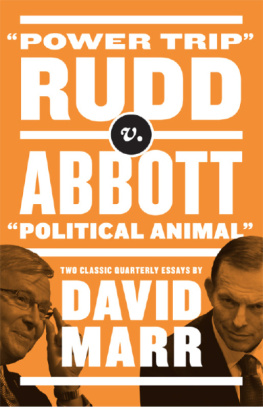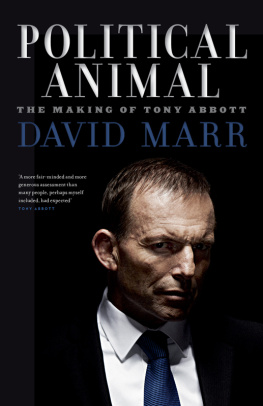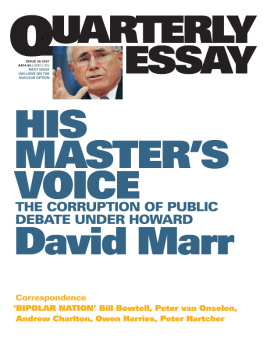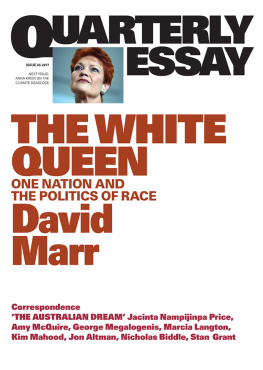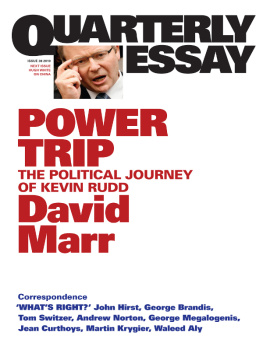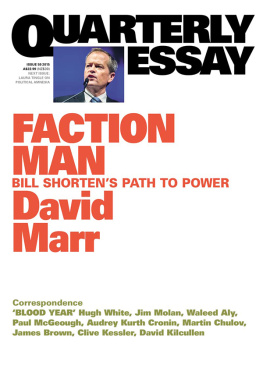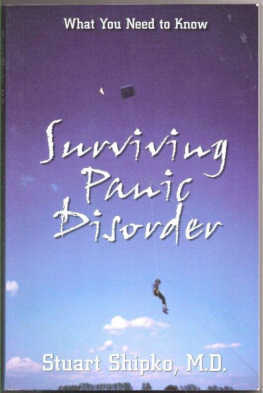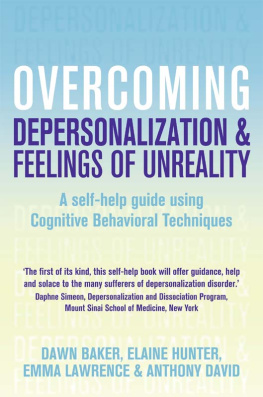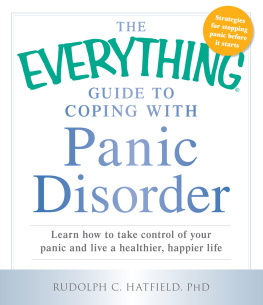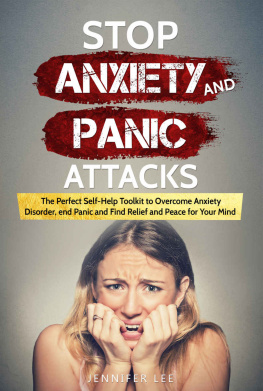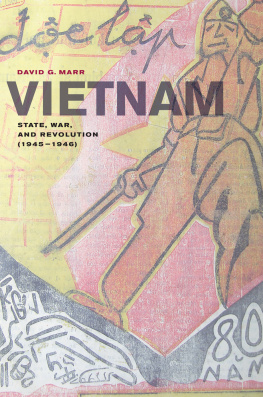Published by Black Inc.,
an imprint of Schwartz Media Pty Ltd
3739 Langridge Street
Collingwood VIC 3066 Australia
email: enquiries@blackincbooks.com
http://www.blackincbooks.com
Copyright David Marr 2013
First published 2011. Reprinted 2012.
David Marr asserts his right to be known as the author of this work.
All Rights Reserved.
No part of this publication may be reproduced, stored in a retrieval system, or transmitted in any form by any means electronic, mechanical, photocopying, recording or otherwise without the prior consent of the publishers.
The National Library of Australia Cataloguing-in-Publication entry:
Marr, David.
Panic / David Marr.
2nd edition.
ISBN for eBook edition: 9781922231093
ISBN for print edition: 9781863956123 (pbk.)
National characteristics, Australian. Australia--Social conditions--21st century. Australia--Economic conditions--21st century.
994.07
Praise for David Marr and Panic
David Marr is not on the list of Australian living treasures, but perhaps he should be. Among our best journalists, he stands out as someone who has consistently challenged the powerful, at his best with forensic skill and deep research. Dennis Altman, Australian Book Review
for those who deplore such panics this is a good tonic Jack Waterford, The Canberra Times
The effectiveness of Marrs writing lies in his ability to stand back and offer sweet reasonableness in the face of events that other reporters would happily play for populist hysteria. The Sydney Morning Herald
Panic is clever, intelligently exposing the language of Marrs right-wing adversaries while separating political rhetoric from political reality. The West Australian
Marr is robust and high-spirited and his wit and down-to-earth language avoid any taint of self-righteousness. The Saturday Age
Less food for thought, more a feast. The Australian Way

Contents
Panic, power and politics in a happy nation. October 2011.
One Nation hits the road. May 1997.
Race, politics and respectable Australians. May 1997.
Waging war on native title. December 1997.
John Howard decides who comes to this country. October 2001.
Letting the drug dogs loose. December 2001.
The scary agenda of the Left. September 2004.
Al-Kateb condemned to everlasting detention. October 2004.
Alan Jones and the business of race riot. December 2005.
Defending the hero broadcaster. December 2006.
Demonstrators today, terrorists tomorrow. March 2007.
The needless ordeal of Mohamed Haneef. July 2007.
Sydney battens down for APEC. September 2007.
Al-Kateb gets his papers. October 2007.
The great American mistake of 1791. April 2008.
Bill Henson and his terrifying photographs. May 2008.
Children, art and virtue. December 2008.
Stonewall and the politics of hate. June 2009.
Our refugee prison far, far away. September 2009.
An underestimated man takes charge. December 2009.
Error, death and the destruction of SIEV 36. February 2010.
The lost politics of reform. November 2010.
Naming and shaming the enemies of rights. December 2010.
Old fears and the toxic politics of the boats. May 2013.
FEAR ITSELF
We are in a panic again. This golden country, so prosperous, so intelligent, so safe and orderly, is afraid of refugees arriving in fishing boats. This is a great Australian fear, one that never really goes away: the fear of being overrun by dusky fleets sailing down from the north. Every time refugee boats appear on the horizon in any numbers, we panic. Facts then count for little. Hearts are hardened. Terrible things are done in the name of protecting the nation. Though this is not the first wave of boats and wont be the last, the politics are more rancorous than ever.
Panic has been with us from the start. Its so Australian. Panic over the Chinese was the midwife of Federation and we have been swept by panics ever since. We were terrified of saboteurs in World War One, Wobblies and Reds in the 1920s, anarchy in the Depression, and Communists all over again after World War Two. Drugs, crime and queers have provoked panic forever, it seems, though lately the thousand-year fear of homosexuals has faded away. So has the old Protestant terror of Catholics. What were they all about? Its a mark of panics that once they die down they seem, looking back, unconvincing and even comic. We used to panic about the novels of D.H. Lawrence and the films of Pasolini. Christians still fight the good fight against smut but unless the victims seem somehow to be children very much a panic of our time public alarm has almost entirely died.
It came to me when I was reporting the mad uproar over Bill Hensons photographs a couple of years ago that Ive been writing about panics all my career: how they are whipped up, do their worst and disappear leaving only wreckage behind. Perhaps Im alert to the subject because Im gay. When I was growing up, preachers, police, politicians and the press were still keeping panic alive about people like me. It has left me despising panic merchants, particularly those Tory fear-mongers who represent themselves as guardians of decency. The politicians I most admire are those who hold their nerve in the face of irrational fear on the rampage. Ive come to believe the fundamental contest in Australian politics is not so much between Right and Left as panic and calm.
Labor drove the early fear of the Chinese, and Labor has been up to its neck at times in panics about Blacks and Reds, poofs and dirty books. Labor cant claim to be always on the side of calm. This is an issue that goes deeper than division between the parties. Its about the odd willingness of Australias leaders to beat up on the nations fears. They coarsen politics. They narrow our sympathies. They make careers for themselves in this peaceful and good-hearted country by managing, from time to time, to make us afraid. The last fifteen years have seen this country in states of exaggerated alarm over native title, Muslim preachers, Muslim rapists, drugs, terrorists both foreign and home grown, demonstrators in the streets and pictures of naked children on gallery walls. But we end the decade as we began in a full-scale panic over refugees coming here as they reach countries all over the world uninvited in little boats.
I was a kid journalist in 1975. My heart was with Whitlam even as I watched his government fall to pieces. His defeat was inevitable but his opponents wanted him out at once. To that end a mighty panic was beaten up in the press, in parliament and at the big end of town. By October 1975, a deeply conservative paper like the Sydney Morning Herald was unashamedly calling on its front page for the overthrow of a government:
It is in the plainest interest of national self-preservation to get rid of a management which has reduced a rich and fortunate country to the verge of economic and social disintegration.
Fantasies of vice-regal power were being promoted everywhere. Lawyers who knew better were calling for the urgent disregard of the constitution. In the midst of that hysteria Whitlam was dismissed by the governor-general. Two lessons were there to be learnt about the politics of panic: how willing conservative politicians in this country are to toy with disorder, and how popular that can be. Whitlams fall was endorsed overwhelmingly at the ballot box. But who except a few Liberal Party hacks and monarchists are left willing to defend 1975?




